Different Types and Shapes of Skateboards
Different Types and Shapes of Skateboards
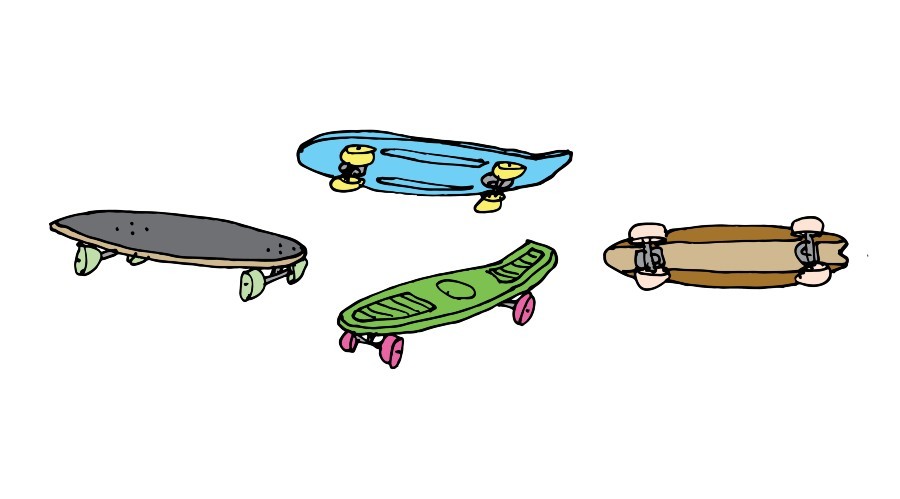
What started as a wooden board with roller-skate wheels in the 1950s, now comes in all different shapes and sizes. The skateboard you choose will depend on your skate style and personal preferences. The main types of skateboards are:
- Classic skateboard: This is the perfect deck for street skateboarding and transition skateboarding, and suits anyone who wants to do tricks on their board.
- Longboard: The stable longboard suits longer rides and fast downhill racing.
- Cruiser or Special Shape skateboards: A good board for transportation, the cruiser deck can also be a good alternative to a wide classic shape.
- Old-school skateboard: Wide retro decks are equally suitable for transportation or transition skateboarding, making these a stable choice.
- Mini-cruiser skateboard: Much like the regular cruiser, but smaller, ultra-light and more compact for even greater convenience. Good for tighter turning and carving.
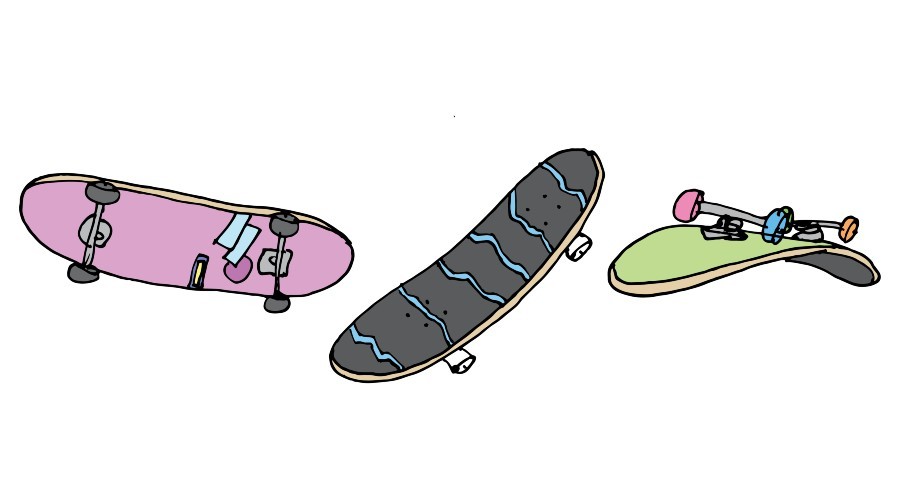
The Classic Skateboard
The “classic” skateboard, that we know today as a standard skateboard, emerged sometime around the early ‘90s and is the type you’ll see most often in the skate park. Most skaters use these boards in the streets or at skateparks.
While they have a traditional shape, you’ll notice they also feature a nose and tail – an upward bent tip – for jumping and flipping. The curved shape of the deck makes the board more responsive to tricks.
A standard skateboard – also known as a street skateboard – is a great choice for beginners or skaters who want a versatile board that they can ride in a variety of ways. Standard boards have a “popsicle” shape, meaning the nose and tail are similar shapes. Standard skateboards are usually ridden with harder wheels, ranging from a durometer rating, or hardness rating, of 98A-101A.
Standard decks are suited for street skateboarding, riding at the skatepark and pretty much any skateboarding style. A street skateboard is recommended if you’re a skater who wants to ollie, kickflip or do any tricks.
Read more about How To Choose a Good Skateboard.
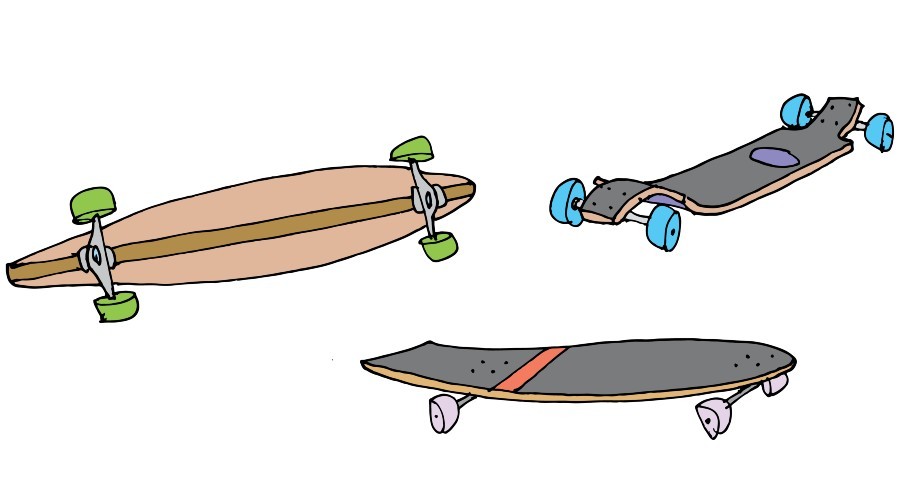
The Longboard or Downhill Longboard
Longboards have their origins in 1950s Hawaii when local surfers decided to try and mimic the surfing experience on land. Longboards, like the name suggests, tend to be longer than the typical skateboard and come in a variety of shapes. The large, soft wheels can handle many terrains, including rough roads and uneven grounds.
Cruising longboards are designed for enjoying a mellow ride, and long-distance longboards (or push longboards) ride lower to the ground to make them easier to push for long distances. Due to the larger size of longboards, they’re not as responsive or easy to manoeuvre, but they can reach high speeds, especially on downhills, and maintain momentum easily.
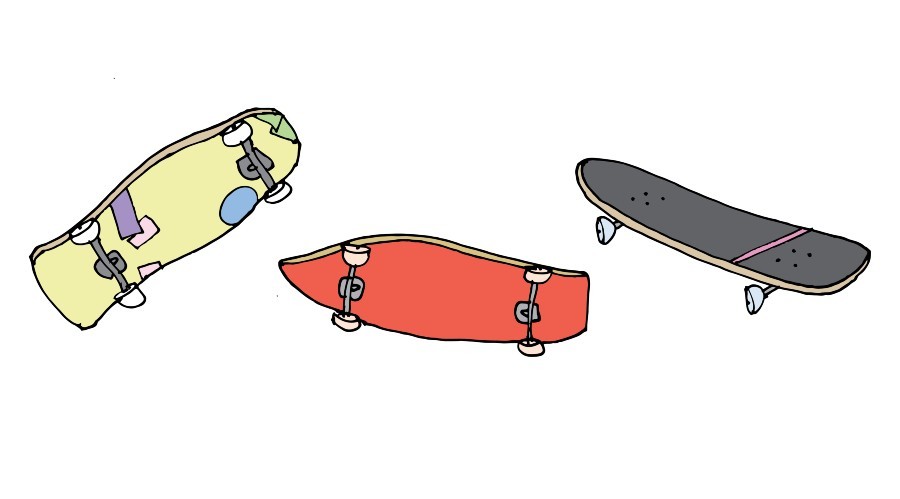
The Cruiser Skateboard or Special Shape Skateboard
Cruisers and Carver Skateboards
Cruisers sometimes referred to as carver skateboards, come in various shapes and sizes, but they’re typically lighter than longboards and taller than the classic skateboard. They’re made for a relaxed cruising experience, offering soft wheels to handle rougher terrains like asphalt and city streets.
Cruisers have an angled nose and tail for easier manoeuvrability. Although not limited to any type of terrain, they’re adept at acceleration and provide a great balance for day-to-day riding. They are nimble and easy to manoeuvre around obstacles that cross your path while riding from point A to point B.
Born in California in the mid-90s, carve skateboards – also known as surf skates – were invented by surfers looking for something to do on days when the swell was flat. These shaped boards feature special front trucks that mimic the feeling of surfing the perfect waves on land.
Special Shape Skateboards
Special shape skateboards have contemporary hybrid shapes that mix influences from old-school and cruiser boards. They win major points for their suitability for both cruising and tricks. So if you’re looking for something that can do a bit of both, special shape skateboards are a solid choice. They’re also a good alternative for street skateboarding and transition skateboarding for advanced skateboarders.
Read more about How To Choose a Skateboard for Beginners.
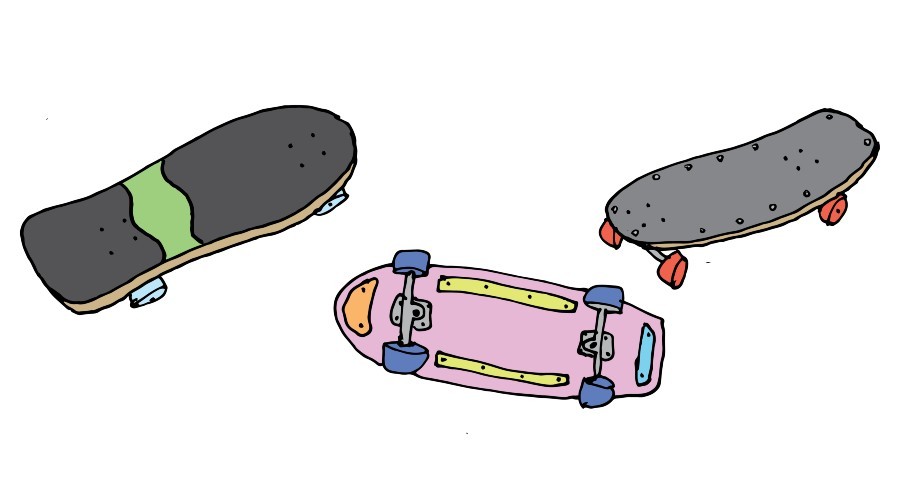
The Old-School Skateboard
The name says it all: old-school skateboard decks are based on vintage-style skateboards. In other words, they’re what people rode back in the good old days when skateboarding was starting to boom.
In contrast to the modern skateboards of today, old-school decks are typically wider, with an asymmetrical shape, smaller nose and broader tail. These stable boards are ideal for pool skating, ramps and shredding the streets.
Learn more about How To Choose Trucks.
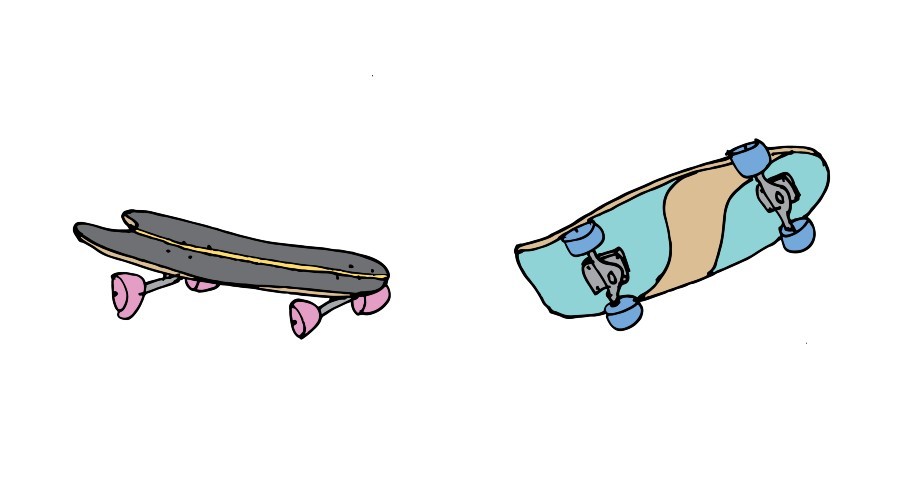
The Mini-Cruiser Skateboard
This skateboard started emerging on the scene in the 1970s and has increased in popularity ever since. The mini cruiser skateboard is the smaller, shorter version of its larger counterpart, the cruiser.
Due to its smaller size and narrower shape, it’s a solid entry-level option for beginners or children, although it's more limiting than a classic skateboard. However, it can also still be used by intermediate skaters looking for a smaller deck to cruise around on. The design also makes this board a great option for students looking for something compact that can easily be slipped into their backpack.
Often made from plastic, mini cruisers usually come with soft wheels, a kick tail and a textured surface. These boards are ideal for tighter turning and carving, but not so much for learning due to their small size.
There you have it! What type of skateboard are you going to choose? Read our related articles for a deeper dive into your options.
SHOP SKATEBOARDS